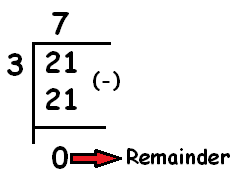FACTORS AND MULTIPLES WORKSHEET
Subscribe to our ▶️ YouTube channel 🔴 for the latest videos, updates, and tips.
(1) Write the factors of 6.
(2) Write the factors of 15.
(3) Write the factors of 18.
(4) List the first 5 multiple of 8.
(5) Check whether 3 is the factor of 21.
(6) Find the number of factors of 48.
(7) Find the number of factors of 30.
(8) List the next three multiple of 12.
12, 24, 36, ___, ___, ____
(9) List the next three multiple of 7.
7, 14, 21, ___, ___, ____
(10) Write the factors of 7.
(11) 24 and 42 are all multiples of 6.
A) True B) False
(12) 62 is a multiple of 8.
A) True B) False
(13) Which list is made up of multiples of 7?
A) 14, 25, 35 B) 19, 26, 33 C) 21, 35, 52 D) 7, 14, 70
(14) The sixth multiple of nine is...
A) 45 B) 15 C) 69 D) 54

Detailed Answer Key
1. Answer :
1 x 6 = 6
2 x 3 = 6
Factors of 6 are 1, 2, 3 and 6.
2. Answer :
15 = 1 x 15
15 = 5 x 3
Factors of 15 are 1, 3,5 and 15.
3. Answer :
18 = 1 x 18
18 = 2 x 9
18 = 3 x 6
Factors of 18 are 1, 2, 3, 6, 9 and 18.
4. Answer :
To get the first 5 multiple of 8, we need to multiply 8 by 1, 2, 3, 4 and 5 respectively.
1 x 8 = 8
2 x 8 = 16
3 x 8 = 24
4 x 8 = 32
5 x 8 = 40
First 5 multiple of 8 are 8, 16, 24, 32 and 40.
5. Answer :
To check whether 3 is the factor 21, first we have to divide 21 by 3. If the remainder becomes zero, then we can decide 3 is the factor 21. Because a factor always divides the product without a remainder.

3 is the factor of 21.
6. Answer :
To get the number of factors of 48, first we have to find the factors.
48 = 1 x 48
48 = 2 x 24
48 = 3 x 16
48 = 4 x 12
48 = 6 x 8
Factors of 48 are 1, 2, 3, 4, 6, 8, 12, 16, 24 and 48.
Number of factors of 48 = 10
7. Answer :
To get the number of factors of 30, first we have to find the factors.
30 = 1 x 30
30 = 2 x 15
30 = 3 x 10
30 = 5 x 6
Factors of 30 are 1, 2, 3, 5, 6, 10, 15 and 30.
Number of factors of 30 = 8.
8. Answer :
In the given question, we have first three three multiples of 12, to get the next three consecutive multiples, we have to multiply 12 by 4, 5 and 6 respectively.
4th term = 12 x 4 => 48
5th term = 12 x 5 => 60
6th term = 12 x 6 => 72
Hence, the next three terms are 48, 60 and 72.
9. Answer :
In the given question, we have first three three multiples of 7, to get the next three consecutive multiples, we have to multiply 7 by 4, 5 and 6 respectively.
4th term = 7 x 4 => 28
5th term = 7 x 5 => 35
6th term = 7 x 6 => 42
The next three terms are 28, 35 and 42.
10. Answer :
Since 7 is a prime number, it has only two factors 1 and the number itself.
Factors of 7 are 1 and 7.
11. Answer :
Writing multiples of 6,
6, 12, 18, 24, 30, 36, 42, 48, 54, ............
In the list given above, we see 24 and 42. So, these are multiples of 6. Then the answer is true.
12. Answer :
To check 62 is a multiple of 8, we have to divide it by 8 incase of we get the remainder 0, we may confirm that it is multiple of 6. Incase we get something else as remainder, we have to say it is not the multiple of 8.
= 62/8

Quotient = 7 and remainder = 6 (it is not 0)
So, 62 is not a multiple of 8.
13. Answer :
Multiples of 7 are,
7, 14, 21, 28, 35, 42, ..............
Option A :
14 and 35 are multiples of 7. But 25 is not. So, option A is incorrect.
Option B :
19, 26 and 33 are not multiples of 7. So, option B is incorrect.
Option C :
21 and 35 are multiples of 7 but 52 is not. So, option C is incorrect.
Option D :
7, 14 and 70 are multiples of 7. So, option D is correct.
14. Answer :
Writing the multiples of 9,
9, 18, 27, 36, 45, 54, 63, 72, ........
The sixth multiples of 9 is 543 So, option D is correct.
Subscribe to our ▶️ YouTube channel 🔴 for the latest videos, updates, and tips.
Kindly mail your feedback to v4formath@gmail.com
We always appreciate your feedback.
About Us | Contact Us | Privacy Policy
©All rights reserved. onlinemath4all.com

Recent Articles
-
SAT Math Problems on Exponents and Radicals
Feb 21, 26 08:28 PM
SAT Math Problems on Exponents and Radicals -
SAT Math Problems on Angles
Feb 21, 26 08:20 PM
SAT Math Problems on Angles -
Digital SAT Math Problems and Solutions (Part - 9)
Feb 21, 26 10:41 AM
Digital SAT Math Problems and Solutions (Part - 9)

